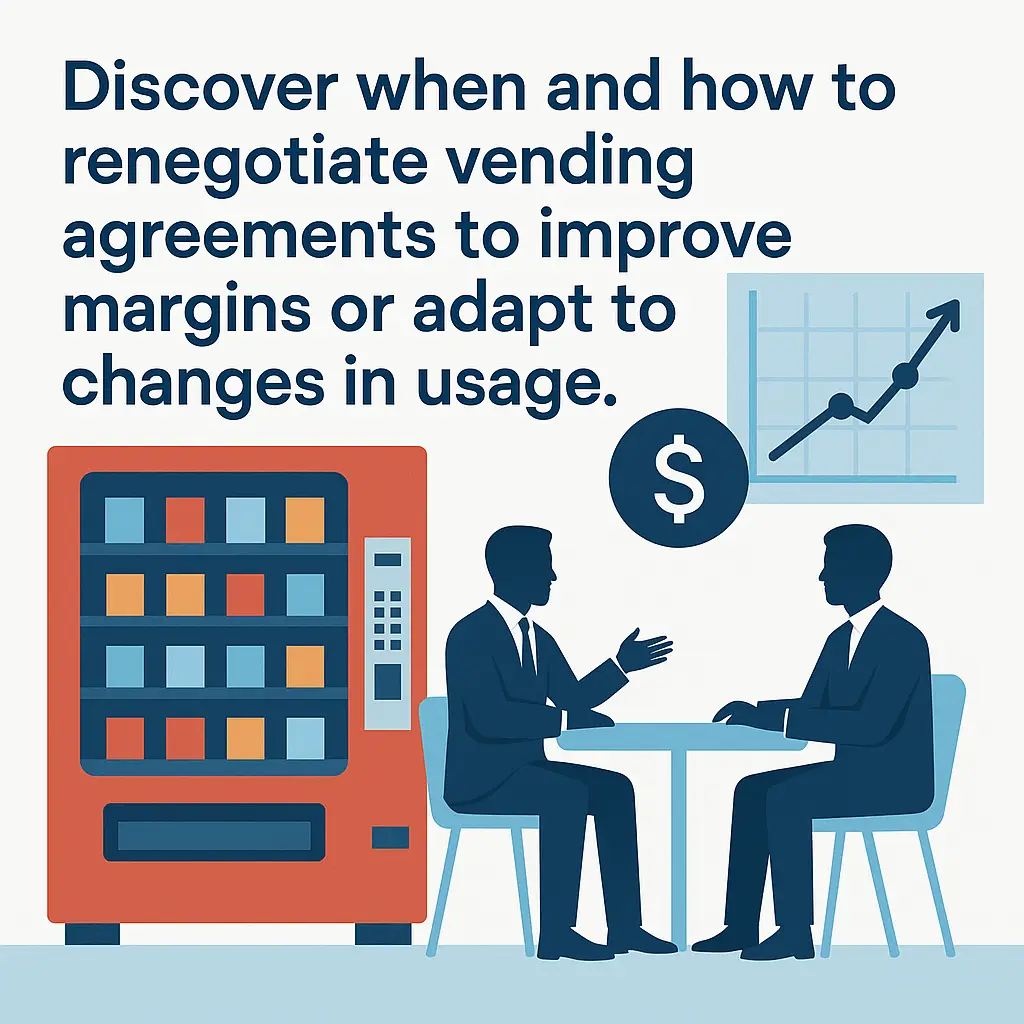How to Renegotiate Location Terms
Discover when and how to renegotiate vending agreements to improve margins or adapt to changes in usage.
Back to Vending Machine Locators ResourcesDiscover when and how to renegotiate vending agreements to improve margins or adapt to changes in usage.
Back to Vending Machine Locators ResourcesStart your 30-day free trial and get instant SMS and email alerts whenever a local business needs vending service. These are real location leads to help you grow your route — you decide which ones to buy, no obligations or contracts.
![]() Usage data helps justify renegotiation with factual insight
Usage data helps justify renegotiation with factual insight
![]() Vendor flexibility often depends on performance and communication
Vendor flexibility often depends on performance and communication
![]() Contracts can evolve as business conditions change
Contracts can evolve as business conditions change
30 days free, then $39 / month.
No Commitment. Cancel Anytime.

Vending operators often find themselves in a situation where the original terms of a location deal no longer make financial or operational sense. Whether it's due to rising product costs, reduced foot traffic, or a change in machine usage, renegotiating location terms is sometimes necessary to ensure both profitability and service quality.
The first step in any renegotiation effort is to gather hard data. Review the machine’s sales trends, profit margins, restock frequency, and any service-related complaints. This performance-based approach will help you present a logical, non-emotional case to your location partner.
Timing is also crucial. Ideally, bring up contract changes during regularly scheduled reviews, or when there's been a notable shift in usage patterns—such as increased maintenance costs or consistently low revenue. If your agreement has just ended or includes a renewal clause, that’s a natural window for renegotiation.
When discussing changes, frame it as a mutual improvement—not just a benefit to your operation. For example, propose upgrading to a newer machine with cashless payments if they agree to a different commission rate or reduced access fees. Emphasizing convenience, product variety, and service consistency can make your proposal more compelling.
It also helps to know what types of terms other operators are securing in similar environments. If a competing location has much lower rental fees or zero commission deals, you can use this as context—though avoid sounding combative or accusatory.
Lastly, prepare a backup plan. If your proposal is rejected, you’ll need to decide whether to maintain the status quo or consider relocating your machine. Consider your ROI, route logistics, and difficulty replacing that spot.
Effective renegotiation is less about confrontation and more about establishing win-win outcomes. With data-driven insights and good communication, most property managers and business owners will understand your need for adjustments—especially if service quality has remained high.
If you’re just starting out and want to avoid lopsided agreements from the beginning, see our guide on finding the right first location. You can also reference our startup checklist for vending operators to make sure your agreement terms are industry standard from day one.
Vending Exchange connects vending operators with real businesses actively looking for vending services—including traditional machines, AI coolers, and office coffee. Get instant SMS and email alerts when new opportunities are available in your area. No contracts or monthly fees—just buy the leads you want. Start your free 30-day trial today and grow your vending business on your terms.
You should consider renegotiation when sales drop, costs rise, or the agreement terms no longer align with current business realities. End-of-contract or renewal periods are also good times to revisit terms.
Bring detailed sales summaries, profit margins, service frequency records, customer complaints, and any trends showing changes in performance to support your request.
Approach the conversation professionally, focusing on shared benefits like improved service or updated equipment. Avoid ultimatums and use data to support your case.
If your proposal is rejected, assess whether continuing under the current terms makes sense financially. You may need to relocate the machine or adjust your product mix.
Yes. Commission rates are often negotiable, especially if you're upgrading machines or offering better service. Propose fair terms based on actual sales.
It can be, especially if the machine underperforms or the access fees are eroding your margin. Use comparative data to justify the request.
Absolutely. Any updates to terms should be documented in writing to avoid future misunderstandings or legal complications.
You can still renegotiate once you've built a service track record. Use your performance and reliability as leverage to improve the agreement.
Agreements commonly range from 12 to 36 months, but terms vary widely. Shorter contracts allow for faster renegotiation if things change.
Yes, sharing industry averages or nearby location benchmarks can help put your proposal in context and make it more justifiable.